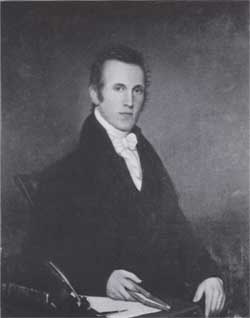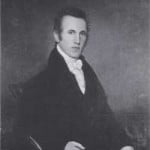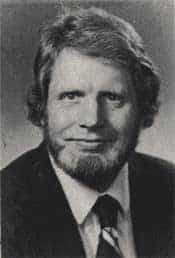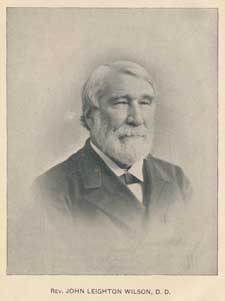This day, August 18th, marks the death, in 1873, of the Rev. Gardiner Spring. He was already 76 years old when he proposed his “Resolutions” at the General Assembly of the Old School Presbyterian Church in 1861. Those were the Resolutions that split the denomination North and South. But long before Spring achieved infamy with his “Resolutions,” he had been, since 1810, the pastor of the Brick Church in New York City. In fact, his entire ministerial career of 63 years was spent at this one church.
Born in 1785, he was educated at Yale and for a short time practiced law before entering Andover Theological Seminary to prepare for the ministry. A powerful preacher, he became a prominent pastor in that City and in the Church at large. Spring made great use of the press as an auxiliary to his preaching of the gospel, and a number of his works remain in print to this day. In 1816, Rev. Spring brought the following message on New Year’s Day, a message having to do with the subject of the revivals of religion.
To read or download the entire message in PDF format, click here.
SOMETHING MUST BE DONE.
2 Chronicles 29:16-17:—
And the Priests went into the inner part of the house of the Lord to cleanse it, and brought out all the uncleanness that they found in the temple of the Lord into the court of the house of the Lord. And the Levites took it, to carry it out abroad into the brook Kidron. Now they began on the first day of the first month to sanctify.
The passage just recited may give a direction to our thoughts. When Hezekiah came to the throne Aof Judah, he found religion in a low and languishing state. His father Ahaz was not only an idolatrous king, but notorious for his impiety. The torrent of vice, irreligion, and idolatry, had already swept away the ten tribes of Israel, and threatened to destroy Judah and Benjamin. With this state of things, the heart of pious Hezekiah was deeply affected. He could not bear to see the holy temple debased, and the idols of the Gentiles exalted; and though but a youthful prince, he made a bold, persevering, and successful attempt to effect a revival of the Jewish religion. He destroyed the high places; cut down the groves; brake the graven images; commanded the doors of the Lord’s house to be opened and repaired; and exhorted the Priests and Levites to purify the temple; to restore the morning and evening sacrifice; to reinstate the observation of the Passover; and to withhold no exertion to promote a radical reformation in the principles and habits of the people.
The humble child of God in this distant age of the world, will read the account of the benevolent efforts of Hezekiah and his associates, with devout admiration. As he looks back toward this illustrious period in the Jewish history, his heart will beat high with hope. Success is not restricted to the exertions of Hezekiah. A revival of religion is within our reach at the commencement of the present year, as really as it was within his, twenty-five hundred years ago. But to bring this subject more fully before you, I propose to show,
What a revival of religion is;
The necessity of a revival among ourselves;
What ought to be done in attempting it;—and
The reasons why we may hope to succeed in the attempt.
I. What is a revival of religion?
We have never seen a general revival of the Christian interest in this city. In two or three of our congregations, there have been some seasons of unusual solemnity, which have from time to time resulted in very hopeful accessions to the number of God’s professing people. But we have not been visited with any general outpouring of the Holy Spirit. Hence, we talk about revivals of religion without any definite meaning; and hence, many honest minds are prejudiced against them. Some identify them with the illusions of a disturbed fancy; while others give them a place among the most exceptionable extravagancies, and the wildest expressions of enthusiasm. But we mean none of these things when we speak of revivals of religion. It is no illusion—no reverie—we present to your view; but those plain exhibitions of the power and grace of God which commend themselves to the reason and conscience of every impartial mind.
The showers of divine grace often begin like other showers, with here and there a drop. The revival in the days of Hezekiah, arose from a very small beginning. In the early states of a work of grace, God is usually pleased to affect the hearts of some of His own people. Here and there, an individual Christian is aroused from his stupor. The objects of faith begin to predominate over the objects of sense and his languishing graces to be in more lively and constant exercise. In the progress of the work, the quickening power of grace pervades the church. Bowed down under a sense of their own stupidity and the impending danger of sinners, the great body of professing Christians are anxious and prayerful. In the mean time, the influences of the Holy Spirit are extended to the world; and the conversion of one or two, or a very small number, frequently proves the occasion of a very general concern among a whole people.
Every thing now begins to put on a new face. Ministers are animated; Christians are solemn; sinners are alarmed. The house of God is thronged with anxious worshipers; opportunities for prayer and religious conference are multiplied; breathless silence pervades every seat, and deep solemnity every bosom. Not an eye wanders; not a heart is indifferent;—while eternal objects are brought near, and eternal truth is seen in its wide connections, and felt in its quickening and condemning power. The Lord is there. His stately steppings are seen; His own almighty and invisible hand is felt; His Spirit is passing from heart to heart, in His awakening, convincing, regenerating, and sanctifying agency upon the souls of men.
Those who have been long careless and indifferent to the concerns of the soul, are awakened to a sense of their sinfulness, their danger, and their duty. Those who “have cast off fear and restrained prayer,” have become anxious and prayerful. Those who have been “stout-hearted and far from righteousness,” are subdued by the power of God, and brought nigh by the blood of Christ.
The king of Zion takes away the heart of stone and gives the heart of flesh. He causes “the captive exile to hasten, that he may be loosed, lest he die in the pit and his bread should fail.” He takes off the tattered garments of the prodigal; clothes him with the best robe, and gives him a cordial welcome to all the munificence of His grace. He brings those who have been long in bondage out of the prison house; knocks off the chains that bind them down to sin and death; bestows the immunities of sons and daughters, and receives them into the glorious liberty of the children of God.
And is there any thing in all this so full of mystery, that it has no claim to our confidence? Behold that thoughtless man! Year after year has passed aaway, while he has been adding sin to sin, and heaping up wrath against the day of wrath. But the Spirit of all grace suddenly arrests him in his mad career. The conviction is fastened upon his conscience that he is a sinner. Fallen by his iniquity, he views himself obnoxious to the wrath of an offended God. He sees that he is under the dominion of a “carnal mind;” his sins pass in awful review before him, and he is filled with keen distress and anguish. He is sensible that every day is bringing him nearer to the world of perdition, and he begins to ask, if there can be any hope for a wretch like him? But, O! how his strength withers, how his hopes die! He is as helpless as he is wretched, and as culpable as he is helpless. The “arrows of the almighty stick fast within him, the poison whereof drinketh up his spirits.”
But behold him now! In the last extremity, as he is cut off from every hope, the arm of sovereign mercy is made bare for his relief. The heart of adamant melts; the will that has hitherto resisted the divine Spirit, and rebelled against the divine sovereignty, is subdued; the lofty looks are brought low; the selfish mind has become benevolent; the proud, humble, the stubborn rebel, the meek child of God. Jesus tells the despairing sinner where to find a beam of hope; the voice of the Son of God proclaims “forgiveness of sins according to the riches of his grace;” the Angel of peace invites and sweetly urges the soul, stained with pollution, to repair to the blood of sprinkling; stung with the guilt of sin, to look up to Jesus for healing and life.
Is this an idle tale? Nay, believer, you have felt it all. And if there is no mystery in this, why should it be thought incredible, that instances of the same nature should be multiplied, and greatly multiplied in any given period? If there are dispensations of grace above the ordinary operations of the Spirit, they may exist in very different degrees at different times. And if the immediate and special influences of the Holy Ghost are to be expected in the edification of a single saint, or the conversion of a single sinner, why may they not be expected in the edification and conversion of multitudes? It is not above the reach of God’s power; nor beyond the limits of His sovereignty. God can as easily send down a shower, as a single drop; He can as easily convert two as one; three thousand as one hundred.
Now this is a revival of religion. We do not pretend to have traced the features it uniformly bears, because it bears no uniform features. God is sovereign. “The wind bloweth where it listeth.” Still, wherever God is pleased to manifest His power and grace, in enlarging the views, in enlivening and invigorating the graces of His own people, and in turning the hears of considerable numbers of His enemies, at the same time, to seek and secure His pardoning mercy, there is a revival of religion.Read the rest of this entry »





